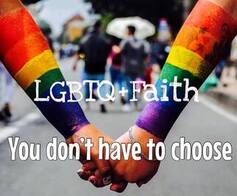 I speak today as both a proud member of our LGBTIQA+ community, and also as a dedicated person of faith, indeed as an Anglican priest. I do so, because people like me are typically erased, our lives and voices ignored. Yet we queer people of faith do exist! - and we are increasingly seeking to be visible. For our very existence gives lie to the monstrous misuse of religion for political ends. We suffer particularly profoundly from religious discrimination. We do not want religious exemptions which hurt us and others, and betray the heart of who we are. We also know that the majority of our fellow Australians of faith agree with us, as we saw in that dreadful postal survey. So we’ve tried to lobby, spoken to Government inquiries, sought to be part of desperately needed change. Yet, as queer people of faith, our rights to religious expression are seldom recognised...
0 Comments
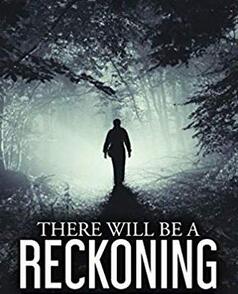 Who would have thought, in Australia in 2019, that, thanks to the insistent Tweets of a rugby player, hell would gain such attention? Hellish is certainly the result for those of us in the rainbow community. Particularly since the recent Federal election, we have been subjected to a deliberate right-wing campaign of aggression and hate, with fresh destructive impacts on our mental health and well being. This is a powerful expression of the vicious distortions of so much of today's media, and the apparent eagerness of some 'religious' groups to promote, or be used by, repulsive reaction in the name of religion. It is also a vivid reminder, both of how theological concepts can have real life consequences, including in the political sphere, and also of the need for a religious, as well as much broader, response by LGBTIQA+ people of faith. For religious-inflicted pain is indeed rife and horrendous among LGBTIQA+ people. Anger at religion as a whole is therefore, as a huge understatement, more than understandable. More moderate 'straight' religious people urgently need to recognise this and join the rainbow community as much more effective allies, with a commitment to genuine listening, deep repentance for religious-based shaming and violence, and powerful commitments to assisting in change. Yet, as it uses religion, we are also unlikely to defeat the hideous distortion that is right-wing 'religious freedom' without better theological scrutiny and the use of religious resources by LGBTIQA+ people of faith, affirmed by other parts of the rainbow community. In this, one key feature is indeed to reclaim the very idea of hell as a theological impulse towards justice for the oppressed, connected with the vision of 'a new heaven and earth' of peace and love, not as punishment of 'the other' by the rich and powerful. For God, if that world is to have reality at all, needs proclaiming as the ultimate source of transforming love in generous diversity, not as a mean tyrant picking on the marginalised. If hell is to have any real meaning, other than as a description of actual lived pain today, then it must be as a reminder that, in some ultimate sense (to use Billy Bragg's words): 'there will be a reckoning for the peddlers of hate... and a reckoning too for the politicians who left us to this fate'... 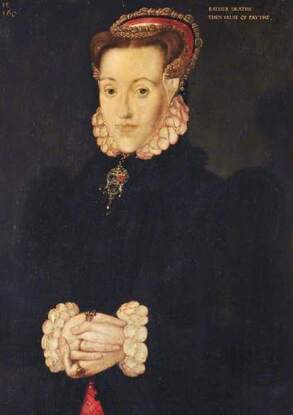 Where do you find feminist religious inspiration when you need it? Sometimes the answer is hidden in plain sight. So it was for me at school. For I was involved with a number of social transformations at my local secondary school, including being part of the first year of the historic admission of females. This not only seemed a self-evident justice to me, but it was also a personal saving grace. Indeed, in my final two years, I was part of otherwise all-female classes for most of my subjects, bar one other male assigned student (in religious studies). Also, to the initial chagrin of some, our 19th century grammar school (founded in 1863 out of the medieval charity created by Thomas De Aston, a 13th century monk) two years later finally fully joined the modern world as a 'comprehensive' school: merging with the local 'secondary modern' school, whose pupils were traditionally divided from us by the selective examination known as the '11 plus'. At which point school 'houses' suddenly appeared, under the names of the well-known local Lincolnshire worthies Tennyson and Wesley; the explorers (Joseph) Banks and (Matthew) Flinders (actually much better known in Australia than in their homeland); the fearsome Hereward (famed indigenous resistance fighter against the Normans), and, more mysteriously, (Anne) Askew. Happily I was placed in her house, but who was this, to us, unknown woman? Sadly, I never really found out then. On asking, apart from guessing that she was the 'token' woman in the list, we were told she was martyred at the Reformation. 'Great', said most of the boys: 'not only do we not get to be associated with a fighter like Hereward, or at least an intrepid explorer like Flinders, but we get landed with a woman, and one whose claim to fame is being slaughtered.' Even the girls had sympathy with the latter affirmation. Yet, had we been given a richer explanation, we might have had a very different viewpoint. For, of all the Lincolnshire icons, it is arguable that Anne Askew was the greatest of all. She was not just a type of freedom fighter (like Hereward), an intrepid adventurer of the new (like Flinders and Banks), a poet (like Tennyson), or a model of renewing spirituality and freedom (like (the) Wesley(s)). She was all these in one, and she did it all as a woman to boot... 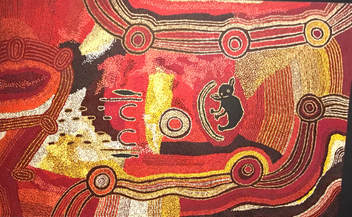 As western society, in a few places, begins to admit (and hopefully address) some aspects of our own male violence and abuse, will we learn to recover old, and create new, stories and images of what matters? Among other aspects of the Songlines exhibition in Canberra, this came home to me again strongly as I was once more struck by the power of the female in ancient storytelling. The powerful moral and cosmological (Seven) Sisters stories for example are told in many ways in different places, including with strong resonances outside Australia (from where the number seven among the sisters may partly have arisen). In the west of Australia the sisters are thus called Minyipuru. As they travel east however, out of Marlu country into the lands of the Ngaanyatjarra and the Pitjantjatjara and Yankunytjatjarra, they become known as Kungkarrangkalpa and Kungkarangkalpa. The details profoundly matter of course, yet they also share so many common themes, not least those of women's survival, resilience and ingenuity in the face of male threat. For the sisters' journeys include pursuit by a male, also known in different places by different names. This man, to try to realise his lust and love, is a shape-shifter. So the story is partly a colourful battle of wits between the male and females, involving all kinds of subterfuges, adventures, and stratagems. Told as they have been for tens of thousands of years, these richly layered stories thus enable both men, and especially young women, to come to terms with our human needs and struggles: sharing a realistic portrayal of the interplay of desire and exploitation, power relationships and flexibility of action. Women are not idealised but their capabilities, and their weaknesses, are no longer buried. They, together with men, become active participants in their moral choices and aware nurturers of one another. As the Aboriginal women of the Songlines exhibition put it, in relation to the painting of Yaritji Young of Tjala Arts (above): We are all kangaru pulka: big sisters to the young women. Like in the Seven Sisters story we must teach and protect our young sisters This is so much more powerful when the story and its morality is enacted in so many different ways. For, as Tjunkara Ken, Yaritiji Young's sister, has said: I hold my father's story. I hold my mothers' story... (it) doesn't come out of paper or out of a book. It's coming out of the ground here. (My way) is different. It comes from the inside out. How will each of us make female dignity a grounded matter of 'inside out'? Such stories also of course have resonance in western traditions, not least in the Bible, where similar comparisons might be drawn to tricksters like Jacob and powerful women such as Deborah and Judith. Indeed, like any living and enduring spiritual stream, despite its deeply patriarchal traditional limitations, Christianity also has its own share of female stories of wisdom, resilience and empowerment. How often however do we hear, sing, dance and embody them, and create new ones? As, so painfully slowly, we come to terms with the damaged feminine in our culture - and above all with the brutal realities and 'hidden' denied abuse of so many women's lives - it is surely time, further prompted by the sisters and the ancient wisdom of the Songlines, to tell and live them. 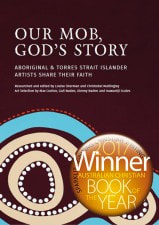 This year is the bicentenary of the Bible Society in Australia and it was wonderful to be given a lovely gift by one of our students which marks the occasion - Our mob, God's story : Aboriginal and Torres Strait Islander artists share their faith. (researched and edited by Louise Sherman and Christobel Mattingley ; art selection by Max Conlon, Gail Naden, Glenny Naden and Inawantji Scales ; with foreword by distinguished Aboriginal artist and educator Miriam-Rose Ungunmerr Baumann) Winner of the 2017 Australian Christian Book of the Year, Our Mob, God’s Story features the work of 66 Aboriginal and Torres Strait Islander Christian artists, well-known and unknown, from communities, towns and cities across Australia, from Tasmania to the Tiwi Islands, from Ceduna to Cairns, form Perth to Wonthaggi, sharing their faith in 115 paintings inspired by Bible verses and stories, many well loved, others not so well known, from Creation to the Crucifixion. All artists have generously given free use of their images, but retain copyright. It is a powerful and beautiful witness to God’s love for the traditional custodians of this ancient continent which we now call Australia, and to the talent of Aboriginal and Torres Strait Islander artists. Publication has been funded by a generous donor and all proceeds will go towards publication of Scripture in mother tongues of Aboriginal and Torres Strait Islander groups. 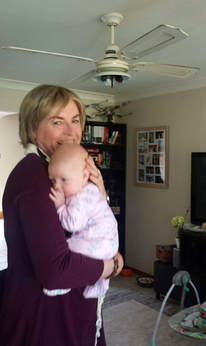 Better late than never? Today I am coming out fully as a transgender person. It has been a lifelong journey to this point and I am sure there are more struggles to come of a different nature. Tonight however I feel the deepest sense of joy and freedom - like that of Paul in his letter to the Galatians (more reflections about that and other wonderful trans affirming parts of the Bible and Christian Tradition in due course) - and I know that I now stand more clearly in the imperishable image of God in which I am created. I feel greatly blessed by this moment and all who have inspired, gone before, supported and/or stood by me. Thank you to anyone reading this who has been part of that :-) For my coming out has profound spiritual dimensions for me which I believe are sources of healing, strength and renewal for us all. Like my little grandchild cradled in my arms in the photograph (see left) I feel more intimately part of God's 'new creation', a little child cradled in the love of God. Below is the letter sent (with the kind support of my archbishop) to my fellow clergy today in the Anglican Church Southern Queensland, together with just a few resources which may help our mutual understanding and growth. Together with the archbishop and my college principal, my loving partner and I pondered and prayed hard about the best way to share my news, aware both of the current contrasting levels of knowledge and care in our churches and also seeking a path of healthy transparency without causing unnecessary reactions in some quarters. I therefore hope and pray that this may be part of our continuing journeys into wholeness and joyful life for us all... 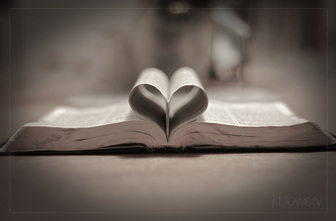 One of the interesting features of criticism raised by some to aspects of 'progressive orthodox' Christian faith is the perceived relationship between love, God and Judaeo-Christian scripture. Progressives can certainly be guilty of simplistic and sentimental thinking, including syllogistic fallacies around such themes. Yet it appears to me that conservative theology sometimes runs the risk of driving a wedge between the God of scripture and healthy, life-giving, human love. In a recent local marriage equality discussion for example, it was somewhat extraordinary to hear a vigorous opponent assert a radical difference between God and human love. In responding to a particular interpretation of 1 John 4.16b - 'God is love, and those who abide in love abide in God, and God abides in them' - they were right in drawing attention to the wider context of that verse, including the prevenient nature of God's love and primary focus in Christ. However such divine love was precisely embodied in the very human life and love of Jesus, expressing the presence of such love throughout creation, in all kinds of different ways. Part of the religious genius of historic Christian Faith has been the ability to hold these different elements in tension, understanding the creative paradox of i John 4.12 that 'No one has ever seen God; (yet) if we love one another, God lives in us, and his love is perfected in us.' Both love, and sin, in my view, are far more complex and mysterious than many 'plain Christian' theologies allow for. Perhaps part of the contrasting responses of Christians lies in how holy scripture is itself conceived. One young man for example said to me recently that the Bible and Christian Faith were not really about love but about salvation. He is on a genuine journey of exploration into these matters and we had a cordial and mutually illuminating conversation. Yet such a view reflects a very common but restricted framework which some Christians have imposed, and continue to impose, on the Bible. In reality of course such a lively and diverse set of scriptures have many contrasting themes. Salvation is a vital, and perhaps particularly distinctive Christian, one. Surely however salvation is but one way of approaching love, rather than the reverse? For all its misuse over the centuries, what has always 'saved' holy scripture is the longing for, and experience of, God which human beings have found in it. Rather than being the Procrustean structure of a salvation machine, the Bible is witness to the eternal love story of God, humanity and creation, embodied, for Christians, most fully in Jesus Christ. We can make too much of names. However I have always been puzzled by Christians who have actively promoted caring for close relationships under titles such as Family First without reflection on the name of the group. For can family, or anything else, really be first for Christians? Surely, for Christians, the love of God as found in Jesus Christ should always be first and foremost? Family, like anything else, must not become an idol. Whilst it is at the bedrock of life, it can also become suffocating and confining. Yet, if so, what place should family have in our lives and world? Such questions take us to the heart of many of the most profound, precious and painful personal issues of our time. These are issues which certainly lie heavily on our hearts and minds and which we need to address prayerfully and tenderly. What can we then say and do to make a positive difference, bringing some light to often over-heated questions?
In our most recent edition of our parish magazine Namalata, we sought to offer a few reflections on different aspects of family, without pretending that it has any simple or complete answers to the complexity of our human relationships. It is tempting to believe we can find easy, straightforward solutions. This is part of the appeal of fundamentalist religion. If only, the claim goes, we stick to a certain set of rules, or go back to an historic ideal which never actually existed, then all our human personal relationships will be sorted. This horribly ignores the reality of human life, with all its differences and struggles for identity. It ignores the heartbreak, courage and mercy in many relationships which do not fit pre-determined norms. Above all, for Christians, it ignores the teaching and practice of Jesus... |
AuthorJo Inkpin is an Anglican priest serving as Minister of Pitt St Uniting Church in Sydney, a trans woman, theologian & justice activist. These are some of my reflections on life, spirit, and the search for peace, justice & sustainable creation. Archives
July 2024
Categories
All
|
 RSS Feed
RSS Feed